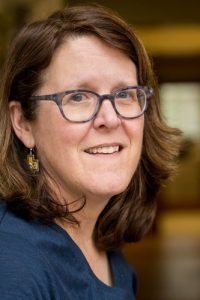Martha Few
312 Weaver Building 212 Curtin Road
University Park, PA 16802
Phone: (814) 865-2278
Curriculum Vitae:
Education:

Biography:
Professor Few specializes in colonial history in the Maya region with an emphasis on Indigenous perspectives and experiences, often writing about medicine and public health, gender and sexuality, environmental history, and human-animal studies. She is Liberal Arts Professor of Latin American History and Women’s, Gender, and Sexuality Studies (2022-present). Her books include Baptism Through Incision: The Postmortem Cesarean Operation in the Spanish Empire (with Zeb Tortorici and Adam Warren, 2020; awarded the Teaching Edition Prize in 2021 from The Society for the Study of Early Modern Women and Gender) and For All of Humanity: Mesoamerican and Colonial Medicine in Enlightenment (2015; awarded honorable mention for the 2016 Bandelier-Lavrin Book Prize for best book in Colonial Latin American History by the Rocky Mountain Council for Latin American Studies). She is also author of Women Who Live Evil Lives: Gender, Religion, and the Politics of Power in Colonial Guatemala (2002) and co-editor of Centering Animals in Latin American History (with Zeb Tortorici, 2013).
Professor Few has been a Fellow of the American Council of Learned Societies, Harvard University’s David Rockefeller Center for Latin American Studies, the Newberry Library in Chicago, the John Carter Brown Library at Brown University, and the Humanities Institute at Penn State University. She is past Senior Editor of the Hispanic American Historical Review (2017-2022), and co-founder and past president of The Southwest Seminar: Consortium on Colonial Latin American History.
Professor Few is currently working on a new book Insects and the Making of the New World, a history of human relationships with six insects — locusts, silkworms, bees, ants, beetles, and cochineal. She is jointly co-authoring a monograph, a global history of the rise and spread of the cesarean operation from the 17th-19th centuries with Adam Warren and Zeb Tortorici.
Selected Journal Articles and Book Chapters:
Martha Few, “Gender, Colonialism, and Disability in the Aftermath of Natural Disasters: Medicalized Trauma and the 1773 Guatemala Earthquake,” in Heather Vrana and David Carey, Jr., New Histories of Disability in Latin America, Johns Hopkins University Press, in press.
Christopher Valesey and Martha Few, “Mesoamerica in the Colonial Period,” El Antropoceno como Crisis Múltiples. Perspectivas desde América Latina / The Anthropocene and Multiple Crises, Volume 1: Biodiversity, eds. Regina Horta Duarte, et. al. Bielefeld University Press, Centro Maria Sibylla Merian de Estudios Latinoamericanos Avanzados (CALAS), 2024, 123-138.
Martha Few, “Insects, Illness, and other Biological Contestations: Locust Superswarms in Eighteenth-Century Central America,” in Jeannie Whayne, ed., The Oxford Handbook of Agricultural History (New York: Oxford University Press, 2024), 93-112.
Martha Few, “The Curing World of María García, an Indigenous Healer in Colonial Guatemala,” in Pablo Gómez and Diego Armus, eds., The Gray Zones of Medicine: Towards a History of Healing and Healers in Colonial and Modern Latin America (University of Pittsburgh Press, 2021), 26-39.
Martha Few, “Epidemics, Indigenous Communities, and Public Health in the COVID-19 Era: Views from Smallpox Inoculation Campaigns in Colonial Guatemala,” Journal of Global History, Special Issue: Pandemics that Changed the World. Historical Reflections on COVID-19, Volume 15, Issue 3 (November 2020), 380-393.
Martha Few, “The Lives and Deaths of Caged Birds: Transatlantic Voyages of Wild Creatures from the Americas to Spain, 1740s-1790s” in Ethnohistory, special issue “Birds and Feathers in the Ancient and Colonial Mesoamerican World,” 67:1 (July 2020), 481-501.
Martha Few, “‘Speaking with the Fire’: The Inquisition Confronts Mesoamerican Divination to Treat Child Illness in Sixteenth Century Guatemala,” in the special issue “Medicine and the Inquisition, Twenty Years After: Novel Approaches and New Research,” Early Science and Medicine 23 (2018) 159-176.
Martha Few “Killing Locusts in Colonial Guatemala,” in Centering Animals in Latin American History, ed. Martha Few and Zeb Tortorici, (Durham, NC: Duke University Press, 2013), 62-92.
Martha Few “Chocolate, Sex, and Disorderly Women in Seventeenth- and Eighteenth-Century Guatemala,” Ethnohistory 52:4 (fall 2005), 673-687.
Graduate Advising at Penn State Since 2016.
PhD and MA advising details for University of Arizona (2004-2016) and University of Miami (1997-2004) available upon request.
Alexandria Herrera: PhD Spring 2025. Latin American History and Women’s Gender, and Sexuality Studies dual Ph.D. degree. Dissertation title: “Female Prostitution in Guatemala City and the Transnational Surveillance of Venereal Diseases, 18802-1950s.” (2018-2024).
Kate Godfrey, (co-advisor/co-chair with Matthew Restall): “Matrilineality and Empire: Indigenous Kinship Networks and Gendered Mobility in Early Modern Colombia” (2016-2022).
Scott Doebler, (co-advisor/co-chair with Matthew Restall): “Arboreal Apogees: Maya, Spanish, and English Ecologies in Lowland Yucatán and Guatemala, 1517-1717” (2016-2022).
Christopher Valesey, (co-advisor/co-chair with Matthew Restall): “‘Managing the Herd’: Nahuas, Animals, and Colonialism in Sixteenth-Century New Spain” (2016-2019).